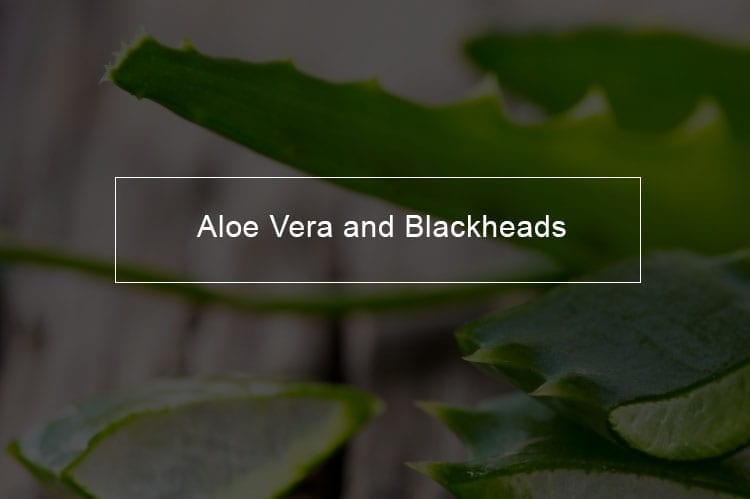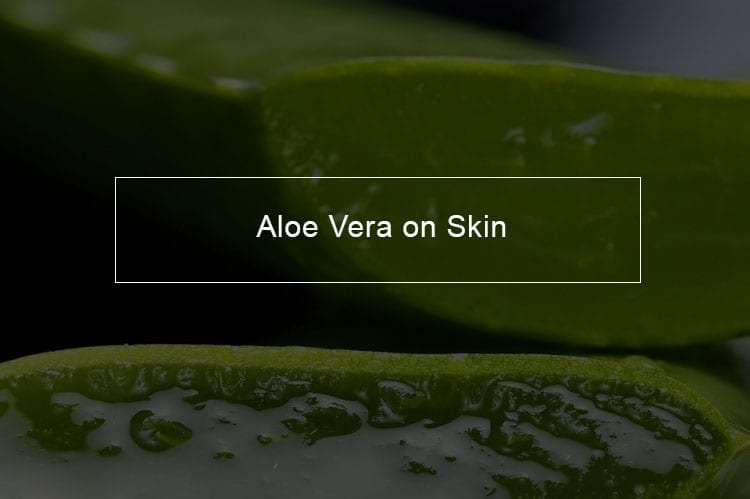
Aloe vera is good for skin and can remove blackheads. It cleanses the skin pores, thus reducing blackheads appearance. However, for proper blackheads removal, you must visit a dermatologist.
What is aloe vera?
Using aloe vera on blackheads
Aloe vera is a cactus-like plant that belongs to the Liliaceae family. It thrives in dry climates like in parts of Africa and India and has been used medicinally for ages. Aloe leaves produce a clear gel in its leaves that can be applied topically to heal wounds and soothe the skin.It is grown worldwide, primarily as a source for "Aloe gel," which is derived from the leaf.The aloe vera plant is broadly used today in:
- Food - it is approved as a flavoring.
- Cosmetics
- Food supplements
- Herbal remedies
The translucent gel is made up of almost 96% water. Aloe vera has one of the most important components, a complex carbohydrate, also called acemannan. It allows nutrients to nurture the cells and subsequently free them of poisons.
What are blackheads?
A comedo is a clogged pore or hair follicle in the skin. Dead skin combines with excess oil blocking the follicle. When it is open it is called a blackhead; when closed it is called a whitehead and can occur with or without acne.
The chronic cutaneous inflammatory condition that includes both comedones, inflamed papules, and pustules (pimples) is called acne. Infection can produce inflammation and the development of pus in pimples. Whether a skin condition is rated as acne depends on the number of comedones present and whether or not it is infected. Comedones should not be mixed up with sebaceous filaments.
Causes of blackheads
Oil production in the sebaceous glands goes up during puberty, causing comedones and acne to be prevalent in adolescents. This also occurs during menstruation and smoking can worsen the situation.
Oxidation and not poor hygiene or dirt makes blackheads to be black. Washing or scrubbing the skin too often could make it worse because it irritates the skin. Touching and picking at blackheads also irritates and might spread infection.Comedogenic skin products can increase the occurrence of comedones by clogging pores, and greasy hair products (like pomades) can worsen breakouts. Skin products that do not clog pores may be labeled as noncomedogenic or non-acnegenic.
Genes play a part in the development of acne making some people are prone to acne than others. Comedones may be more prevalent in some ethnic groups too. Persons of recent African descent may get more inflammation in comedones, more comedonal acne, and earlier onset of inflammation.
The Benefits Of Using Aloe Vera On The Skin

1. It's nutrient rich for good health. The gel contains many different nutrients like vitamins, minerals, enzymes, sugars, anthraquinones or phenolic compounds, lignin, saponins, sterols, amino acids, and salicylic acid.
2. It is highly anti-inflammatory. It can help treat acne and dry skin.
3. It works best on superficial acne rather than cystic or deeper acne, making it ideal for use on blackheads. The enzymes present in it can also help exfoliate the skin making it smoother.
4. It is a moisturizer. Aloe moisturizes the epidermis without leaving a greasy feel, so it`s perfect for those with combination to oily skin. For those who use mineral-based make-up, aloe vera serves as a moisturizer and is excellent for the face before the make up application to prevent skin drying.
Although Aloe Vera can help moisturize the skin, when overused, it can dry out the skin. Some enzymes present in it act like an exfoliator, and when you exfoliate the skin too much, it will either become too oily or too dry depending on your skin type.
5. It helps treats acne. Aloe vera gel contains two hormones namely Auxin and Gibberellins. They provide wound healing and anti-inflammatory properties that decrease skin inflammation. Giberellin acts as a growth hormone stimulating new cell growth reducing the chance of blackheads. It lets the skin heal faster and naturally with minimal scarring.
How to use Aloe vera on blackheads
Aloe and Lemon Mask
This aloe mask with lemon juice also serves as a natural skin brightener. If you don't have lemons, try using limes or grapefruit.
- Pick a leaf from the plant and extract the gel from it.
- Mash the gel with 1/8 teaspoon of lemon juice.
- The lemon juice can also help preserve the mask in case you want to apply the residual mask the following day. Avoid using more lemon, as it might irritate. You can blend the ingredients to create a paste.
- Apply the aloe vera, lemon mask on your face and neck and massage lightly, avoiding the eyes.
- For about 15-20 minutes, let it sit then rinse it off with warm water.
- Pat your skin dry and apply your preferred moisturizer.
- The remaining facial mask can be stored in the refrigerator for use the following day.
- Use this regimen about three times a week to clear away and breakouts, even out the skin tone and prevent new blackheads from forming.
Soothing Aloe and Honey Mask
This face mask combines the anti-inflammatory qualities of aloe with the anti-microbial and moisturizing features of honey for a powerful remedy that can soothe and calm your skin while combating blackheads at the same time.
- Add 1 tablespoon of Aloe gel, either fresh or store-bought, to a bowl.
- Add in a tablespoon of honey to the bowl. Raw organic honey works the best.
- Stir the ingredients until they're well-combined.
- Apply the mask to your face, focusing on all the affected areas.
- Let the mask sit for about 20 minutes.
- Rinse your face with warm water.
- Pat your skin dry and apply your preferred moisturizer.
Aloe Vera, Milk and Sugar Mask
This mask calms, moisturizes, brightens and fights blackheads with the additional scrubbing power of sugar and soothing milk. Sugar, a natural source of glycolic acid, aids in cell turnover. It's also a humectant, so it serves to draw in moisture to the skin. Milk has been used in skin care because of its soothing, moisturizing, brightening and toning properties.
- Combine 1/2 a tablespoon of milk to a tablespoon of sugar until the latter completely dissolves. Then add 2 tablespoons of freshly harvested or store-bought aloe gel and mix well.
- Apply the mask to your face; let it sit for about 20 minutes.
- Wash off the aloe sugar mask with lukewarm water and pat the face dry with a towel.
- Apply a moisturizer when done.
Aloe vera with lavender essential Oil
It is highly advisable to rub juice or gel of Aloe Vera on a cotton pad to get rid of blackheads from the skin. The significance is to tighten the skin pores, and a combination of a few drops of lavender essential Oil with egg white will undoubtedly help to erase the blackheads from the skin.
Aloe vera with garlic mask
The readily available ingredients can assist in solving blackheads from the skin. The magical values of a mixture of 2-3 cloves of garlic and a teaspoon of Aloe Vera gel will certainly get rid of blackheads from the skin. After rubbing for ten minutes, one can wash off the paste with fresh water.
Aloe vera with honey
One can the result of attaining flawless skin by rubbing aloe vera and honey. The mixture will cleanse the skin from within and also extract excess Oil from the skin. It will also get rid of blackheads from the surface of the skin.
Aloe vera with vitamin E supplements
Vitamin E oil is the right substance to combine with Aloe Vera and rub to remove blackheads. The magical blend will offer acne free looks. To achieve smooth skin without blackheads, one can nourish the skin with essential cleansing substances. Cleansing and removing spots on the skin are regarded to be most vital, and it needs to be done according to skin types. Alternatively, you can use coconut oil if, for some reason, you cannot use aloe vera to get rid of blackheads.
Reminders before using Aloe Vera
a. Aloe vera can cause irritation to allergic reactions in those with sensitive skin.Perform a patch test prior to using a new product by applying a tiny amount of aloe vera gel to your skin and wait to see if there will be a reaction. If it reacts, either resulting in redness or rashes, then do not attempt to use it or any products containing it.
b. Clean the leaf well before using or processing it.
c. Wear gloves when slicing the aloe leaf because they contain aloin, which can trigger irritation in individuals with latex allergies.
d. Use fresh aloe juice when preparing homemade beauty treatments, if available.
e. Symptoms of aloe vera allergy :
- redness
- rashes
- burning feeling
- skin inflammation
f. If you're allergic to tulips, garlic or onions, your skin may react badly to aloe usage. It has also been observed that prolonged topical use of aloe vera may cause to the development of skin allergies that present as hives or eczema. If this happens, wash off the aloe immediately and take an over-the-counter antihistamine.
Ways to prevent blackheads
In addition to using an aloe treatment mask, there are many other things you can do to get rid of blackheads and prevent new breakouts. Combining more than one method or treatment increases your chances of getting clear, glowing skin.
i. Cleanse your face twice daily. Using a gentle, mild cleanser. Even for those with oily skin, harsh cleansers only strip it of its natural oils and irritate the skin, exacerbating redness and making any current blackheads and blemishes more noticeable.
ii. Moisturize every time you wash with a non-comedogenic moisturizer meant for your skin type.
iii. Avoid harsh scrubbing of the affected areas.
iv. Always take off any makeup before you go to bed.
v. Exfoliate about once or twice a week. Lightly buff away dead skin with a soft washcloth or utilize glycolic acid pads, which are applied just as toner. For sensitive skin, try an enzyme-based face mask once a week instead of physically exfoliating.
vi. Let your face breathe. Don't use makeup too much. If you have to put on makeup all the time, ensure you choose non-comedogenic cosmetics. If you react to most foundations, opt for a natural mineral powder to help even out your complexion without triggering breakouts. There are several formulas available for all diverse skin types, whether you have dry, oily or combination skin.
vii. Try a retinol cream. Retinol-based products are ideal for the prevention of blackheads and wrinkles. While OTC retinol creams don't have a huge percentage of the active ingredient unlike some prescription retinoids, they can serve in the long term to restrict the development of new blackheads. Retinol is a vitamin A derivative that aids in raising cell turnover and exfoliating dead skin cells, which prevent clogged pores. Putting on a thin layer once in the evening, and following up with a soothing moisturizer will help to prevent dryness and irritation.
viii. Avoid touching your face.
ix. Clean your towels and pillowcases often to remove the dead skin cells and oil.
x. Eat healthily; healthy skin starts from within.
xi. Hydrate. Consume a lot of water as it can help flush out toxins of the body and keep the skin moisturized from the inside.




